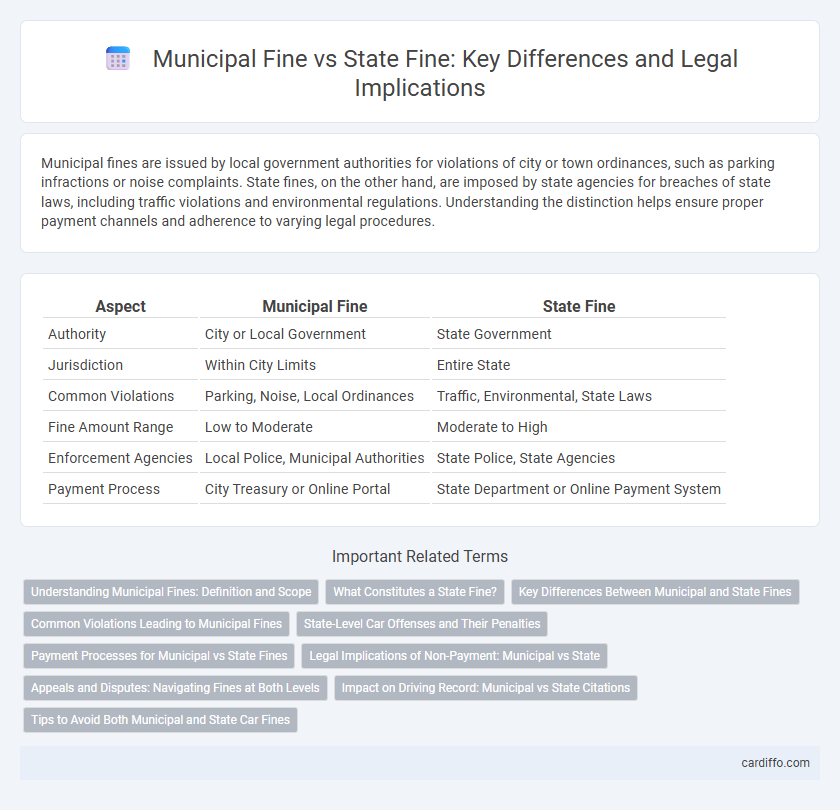Municipal fines are issued by local government authorities for violations of city or town ordinances, such as parking infractions or noise complaints. State fines, on the other hand, are imposed by state agencies for breaches of state laws, including traffic violations and environmental regulations. Understanding the distinction helps ensure proper payment channels and adherence to varying legal procedures.
Table of Comparison
| Aspect | Municipal Fine | State Fine |
|---|---|---|
| Authority | City or Local Government | State Government |
| Jurisdiction | Within City Limits | Entire State |
| Common Violations | Parking, Noise, Local Ordinances | Traffic, Environmental, State Laws |
| Fine Amount Range | Low to Moderate | Moderate to High |
| Enforcement Agencies | Local Police, Municipal Authorities | State Police, State Agencies |
| Payment Process | City Treasury or Online Portal | State Department or Online Payment System |
Understanding Municipal Fines: Definition and Scope
Municipal fines are penalties imposed by local government authorities for violations of city or town ordinances, such as parking infractions, noise violations, and building code breaches. These fines are limited in scope to the municipality's jurisdiction and are designed to enforce community standards and local regulations. Understanding the distinctions between municipal fines and broader state fines is essential for compliance and legal clarity.
What Constitutes a State Fine?
A state fine is a monetary penalty imposed by state government authorities for violations of state laws or regulations, such as traffic infractions, environmental breaches, or criminal offenses. It typically results from offenses that fall under state jurisdiction and is collected according to state legal frameworks and statutes. These fines support state-level public services and legal systems, distinguishing them from municipal fines, which are issued by local city or town governments.
Key Differences Between Municipal and State Fines
Municipal fines are typically imposed by city or local governments for violations of local ordinances, such as parking infractions or noise complaints, whereas state fines are issued by state authorities for breaches of state laws, including traffic violations or criminal offenses. The amount of municipal fines is usually lower and limited by local regulations, while state fines tend to have higher penalties reflecting broader jurisdictional authority. Enforcement also differs as municipal fines are processed through local courts, whereas state fines often involve state courts or agencies.
Common Violations Leading to Municipal Fines
Common violations leading to municipal fines typically include parking infractions, noise disturbances, and local ordinance breaches such as littering and property maintenance issues. Municipal fines are enforced by city or town authorities and often address community-specific regulations that aim to maintain public order and safety. State fines, contrastingly, usually relate to broader legal violations like traffic offenses, criminal acts, and regulatory non-compliance governed by state law enforcement agencies.
State-Level Car Offenses and Their Penalties
State-level car offenses often carry more severe penalties than municipal fines, reflecting the broader jurisdiction and stricter enforcement by state authorities. Common state violations include speeding above specific thresholds, DUI (driving under the influence), and reckless driving, with penalties ranging from hefty fines and license suspension to imprisonment. Understanding these state-imposed sanctions is crucial because they impact driving records and insurance rates far more significantly than typical municipal fines.
Payment Processes for Municipal vs State Fines
Payment processes for municipal fines typically involve local government portals or designated city offices, allowing residents to pay online, by mail, or in person within set deadlines. State fines often require interaction with state-level agencies, such as the Department of Motor Vehicles or state courts, and may offer additional payment methods including phone payments or installment plans. Both municipal and state fines impose late fees if payments are not made promptly, but state fines often have more complex enforcement mechanisms like license suspension or state tax refund interception.
Legal Implications of Non-Payment: Municipal vs State
Non-payment of municipal fines often results in local penalties such as increased fees, property liens, or vehicle registration holds, directly affecting community services and local governance. State fines carry broader legal implications that may include statewide license suspensions, arrest warrants, and potential criminal charges, impacting individual rights across all jurisdictions within the state. Understanding these distinctions is crucial for addressing fines promptly to avoid escalating legal consequences and ensure compliance with both municipal and state laws.
Appeals and Disputes: Navigating Fines at Both Levels
Municipal fines are typically contested through local administrative offices or municipal courts, allowing for streamlined appeal processes specific to local ordinances. State fines, governed by broader state laws, often require appeals in higher state courts or specialized tribunals, involving more complex legal procedures. Understanding jurisdictional boundaries and procedural requirements is essential for effectively navigating disputes and minimizing financial penalties at both municipal and state levels.
Impact on Driving Record: Municipal vs State Citations
Municipal fines typically result in points being added to a driver's record only within local jurisdiction databases, often having limited impact beyond municipal boundaries. State fines, especially those tied to traffic violations, usually affect state driving records and can lead to higher insurance premiums and license suspensions. Understanding the distinction between municipal and state citations is crucial for managing the long-term consequences on a driver's record and overall driving privileges.
Tips to Avoid Both Municipal and State Car Fines
To avoid both municipal and state car fines, always adhere to posted speed limits and traffic signals, ensuring compliance with local and state traffic laws. Regularly update your vehicle registration and licensing to prevent administrative penalties, and avoid parking in restricted areas by thoroughly reading all signs. Utilizing GPS apps that alert users to speed cameras and traffic violations can further minimize the risk of incurring fines across different jurisdictions.
Municipal Fine vs State Fine Infographic

 cardiffo.com
cardiffo.com